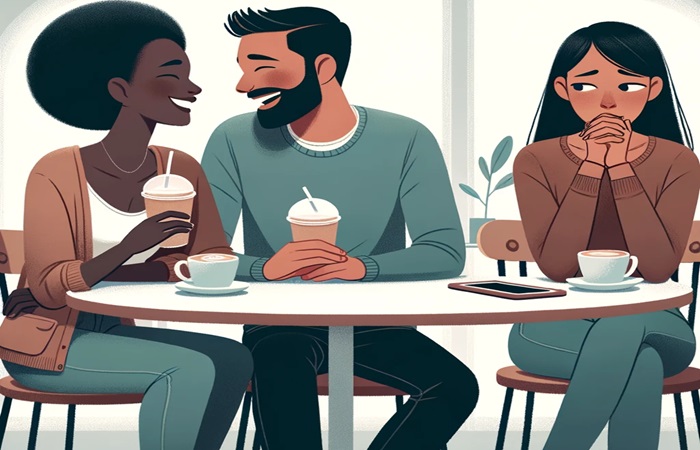Navigating our feelings around relationships, especially when observing couples, can sometimes lead to feelings of discomfort. From personal experiences to societal influences, there are various reasons why some individuals might feel uneasy around couples.
Reasons Why Couples Might Make Someone Uncomfortable
1. Personal Experiences
Past traumas or negative experiences in relationships can leave lasting scars.
An individual might have unresolved feelings from past relationships.
Witnessing a couple can trigger memories of those experiences.
Past betrayals or heartbreaks can cause anxiety when seeing couples.
Observing couples can also bring up feelings of vulnerability or distrust.
2. Jealousy
Jealousy can stem from comparing one’s own life to others.
Seeing a couple happy together can make someone wish they had a similar bond.
Jealousy can also arise from past rejections or feelings of inadequacy.
It might evoke feelings of missing out or being left behind.
This emotion can be intense and might overshadow rational thoughts.
3. Loneliness
Observing couples can highlight one’s own single status.
It can remind individuals of past relationships or the desire for companionship.
Loneliness can create feelings of isolation or being out of sync with peers.
Seeing couples might emphasize the lack of emotional connection in one’s life.
It can also trigger fears of ending up alone.
4. Third Wheel Feeling
Being around couples can sometimes make one feel like an outsider.
Conversations might revolve around couple-related topics, making someone feel excluded.
There might be moments where the individual feels they’re intruding.
Couples might share inside jokes or memories that others can’t relate to.
The balance of group dynamics can shift, making an individual feel less included.
5. Cultural or Familial Beliefs
Some cultures or families discourage public displays of affection.
Individuals from such backgrounds might feel uneasy seeing couples being affectionate.
They might have been taught that such behaviors are inappropriate or disrespectful.
Personal beliefs and values can clash with what they witness.
This can create a sense of conflict or discomfort.
6. Overly Affectionate Couples
Some people are not comfortable witnessing excessive public displays of affection.
They might feel these displays are too private for public spaces.
It can feel like an invasion of personal space or boundaries.
Overly affectionate behaviors can be perceived as inconsiderate or thoughtless.
Some might feel it’s an attention-seeking behavior from the couple.
7. Personal Space
Everyone has their comfort zone regarding physical and emotional space.
Couples, especially new ones, might unintentionally invade this space.
This can create feelings of discomfort or unease.
Respecting personal boundaries is crucial for maintaining comfort.
Continuous disregard for personal space can lead to strained relationships.
8. Fear of Commitment
Seeing couples can remind some of their fears or anxieties about commitment.
It can trigger worries about future responsibilities or the possibility of heartbreak.
Some might fear losing their independence or sense of self.
The idea of compromise or change can be daunting for some.
Past experiences might have shaped a fear of settling down or making long-term commitments.
What to Do When Feeling Uncomfortable Around Couples
- Self-awareness:
- It’s essential to introspect and understand the root cause of discomfort.
- Recognizing personal triggers can be the first step towards healing.
- Journaling or self-reflection can help in identifying patterns or recurring feelings.
- Understanding oneself can lead to better coping mechanisms.
- It can also pave the way for personal growth and development.
- Talk About It:
- Sharing feelings can provide relief and perspective.
- Trusted friends or family members can offer support and understanding.
- Discussing feelings can also lead to solutions or coping strategies.
- Talking can help in normalizing feelings and realizing that one is not alone.
- Communication is crucial for emotional well-being and mental health.
- Set Boundaries:
- It’s okay to communicate personal boundaries to those around you.
- If specific behaviors make you uncomfortable, express it politely but firmly.
- Setting boundaries can lead to more respectful and harmonious relationships.
- It ensures that personal space and feelings are valued.
- Boundaries provide a sense of security and control over one’s environment.
- Engage in Self-care:
- Taking time for oneself is essential for emotional well-being.
- Activities like reading, meditation, or hobbies can provide a sense of calm.
- Physical activities like walking or yoga can reduce feelings of anxiety or discomfort.
- Self-care can also involve seeking professional help if feelings become overwhelming.
- It’s a reminder to prioritize oneself and one’s feelings.
- Seek Professional Help:
- Therapists or counselors can provide insights and coping strategies.
- They can offer a safe space to discuss feelings and fears.
- Professional guidance can lead to personal growth and better mental health.
- Therapy can provide tools to deal with discomfort or negative feelings.
- It’s a step towards self-awareness and healing.
- Join Social Groups:
- Engaging in diverse social groups can reduce feelings of isolation.
- Meeting different people can provide a broader perspective on relationships.
- Activities or clubs can offer a sense of belonging and reduce feelings of being a ‘third wheel’.
- Diverse social interactions can lead to personal growth and understanding.
- It can also provide opportunities to forge new connections and friendships.
Conclusion
We’ve all had moments where we’ve felt a twinge of discomfort or unease in certain situations, including being around couples. It’s a part of the complex web of human emotions.
Remember, it’s okay to feel this way. The key is to understand and address these feelings, ensuring we maintain healthy relationships with ourselves and others.
